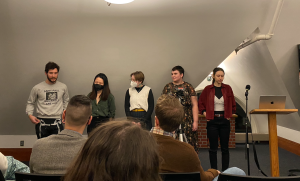Creative Writing Majors Present Their Capstones!
Contact
The Words: Macalester's English Student NewsletterSenior Newsletter Editors:
Birdie Keller '25
Daniel Graham '26
Callisto Martinez '26
Jizelle Villegas '26
Associate Newsletter Editors:
Ahlaam Abdulwali '25
Beja Puškášová '26
Sarah Tachau '27
Peyton Williamson '27
By Chloë Moore
On November 30th, in lieu of a traditional Coffee House, students in the Creative Writing capstone presented their semester-long Capstone projects! We heard from Kathryn Alldaffer, Andrea Liu, Ruby Rich, Mae Sullivan, and Ben Zimet. The capstone was led by Professor Matt Burgess, and the goal of the class was to produce a minimum of 60 pages. Students wrote novels, prose, and poetry, and throughout, “created a community where people [could] support each other on their individual journeys,” according to a very #proud and #blessed Matt Burgess.

Kathryn Alldaffer kicked off the evening with a presentation of her short story collection, Metamorphosis. Drawing on her work as an English/Classics double major, the collection contains five retellings of myths from the Greco-Roman tradition. Kathryn shared on two of her stories: Upon the Funeral Pyre, which retells Virgil’s story of Dido after her betrayal by Aeneas, and Salt-Sown Fields, which follows Ceres in the wake of her daughter, Persephone, being kidnapped to the Underworld by Hades. In describing the collection, Kathryn talked about the research that each story necessitated, the inspirations she found in stories like that of Apollo and Daphne, her desire to push against modern romanticizations of some stories, and her goal of giving her female characters happy endings.
We heard next from Andrea Liu, an English minor and Asian Studies major, who presented her collection of three stories: Homebound Itinerants: Marginalization in Transition. In keeping with her interest in diverse literature, the stories follow 3 female protagonists moving between the United States and China. The stories, Mother of Jade, Strange Fruits, and The Graduation Trip deal with rural identity, gender, class, colorism, age, family, and marginalization in liminal spaces. Andrea described the process of creating unique voices for her characters, figuring out how to make character networks, and to represent familial connections and lifelong marginalization. She also read several wonderful excerpts from her stories!
Ruby Rich followed, with a discussion of the screenplay for her series, Jewels (or possibly Willow, depending on when you asked her about the title). A Media and Cultural Studies major and Creative Writing minor, she used film theory as a basis for her writing, continuing a project she had worked on in two previous screenwriting classes. Jewels is a coming-of-age story about a high-school senior named Willow as she starts group therapy, meets a new boyfriend, joins the school musical, and navigates familial tensions. Willow explores themes of self-surveillance, life inside one’s head, neurodivergence, and movement, with fantastical elements and music adding to the story.
Then, Mae Sullivan presented the beginnings of her novel, Poison-Tipped Thorn, which follows, in her words, “a witch in the woods, a little farm-boy, and a fantastical adventure.” A blend of Disney-inspired love and magic and Brothers Grimm-esque darkness and body horror (though with less incest), Poison-Tipped Thorn is as much about the story as it is about the genre conventions of fairy tales themselves. Mae was guided by Philip Pullman’s five pillars of fairy tales– conventional stock figures, celerity, limited imagery, focus on story over language, and anonymous tone– in that she chose to ignore them all! So, her challenge was to write a fairy tale without using any of his pillars of the genre, which resulted in a narrative full of complex characters, vivid imagery, descriptive setting, and beautiful language. As a nod to the genre, Mae described the tropes she kept from the genre, namely a witch in the woods with a garden of potion ingredients, a journey through a magical forest, a tricky little goblin, and an evil mother figure. Both traditional and innovative, Mae’s novel sounds like a must-read.
Last but certainly not least, we heard from Ben Zimet, about their story, Lefty. The story follows a story about a gay, gender non-conforming baseball pitcher, told by his long-time catcher, Buck. Inspired by baseball players like Glenn Burke (the first out MLB player), Zack Greinke and Mitchell Williams (two noted “space aliens” of the sport), and Dock Ellis and Keith Hernandez (both memoirists), Lefty the character is a larger-than-life character with a reserved private life. The story is unreliably narrated by Buck, who is telling it after Lefty’s death, and whose narration is impacted by the fact that he is both homophobic and misogynistic. But, his goal is ultimately to honor Lefty’s legacy, and for Ben, the writing process was, “a culmination of [their] writing experience at Mac, an exploration of self, gender, and sexuality, and a way to see [their] growth as both as a person and a writer.”
A huge congratulations to our Capstone students on their incredible projects, and a big thank you to everyone who came out to support them for their presentations!